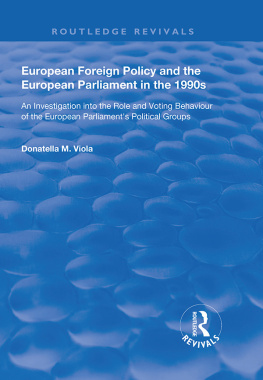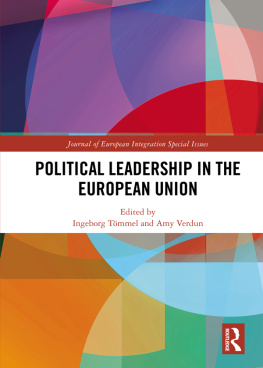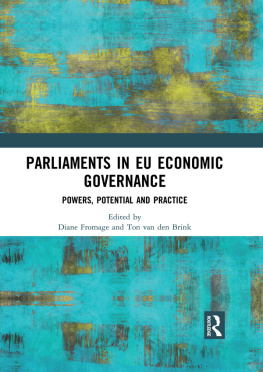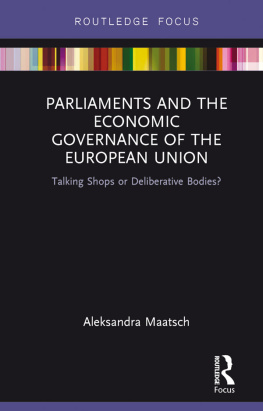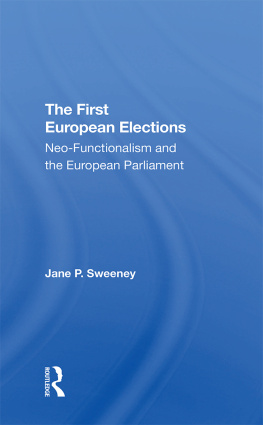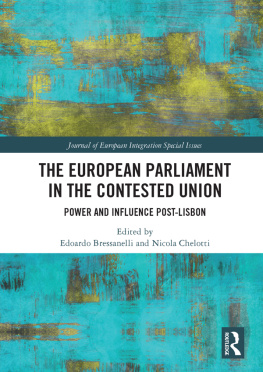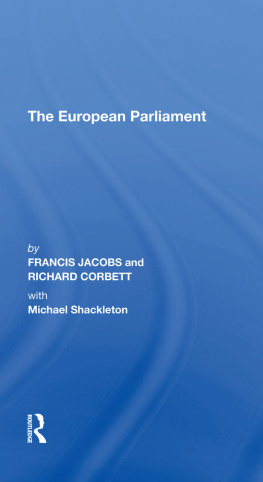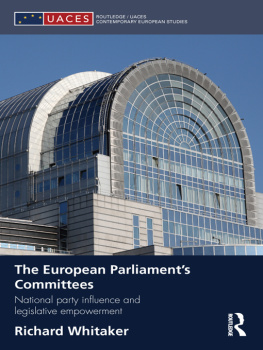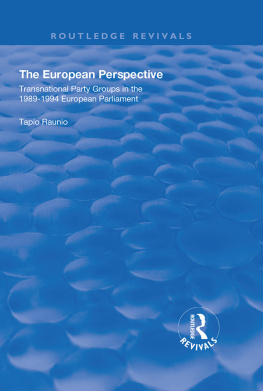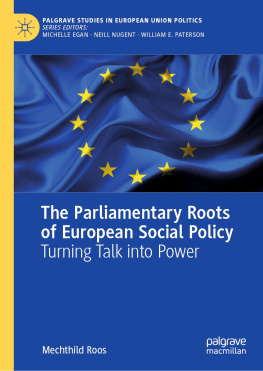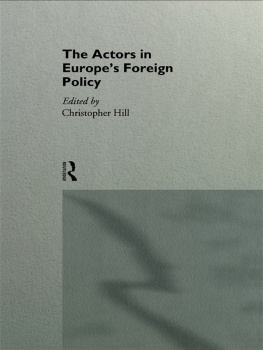EUROPEAN FOREIGN POLICY AND THE EUROPEAN PARLIAMENT IN THE 1990s
The book investigates the European Parliaments stance vis--vis two major events of the 1990s: the Gulf and the Yugoslav crises. In unveiling the parliamentary multi-faceted view of these events, reference has been made to the positions taken by constituent political groups and their voting behaviour. In particular, the following questions have been addressed: has the European Parliament sought to define and shape a common foreign policy with respect to the above crises? What specific functions have the European Parliaments political groups performed? Have they succeeded to achieving an internal cohesion? Has the European Parliament overcome divisions among its members through the formation of party coalitions? Despite the considerable flow of published material on external relations of the European Union and the European Parliament, virtually no study has explored in-depth the links between these two areas. The purpose of this book is to fill the gap in the existing literature, breaking new ground by combining a qualitative and quantitative analysis of parliamentary behaviour in the field of foreign policy.
Donatella M. Viola has done a meticulous forensic job of examining the roles of political groups in the European Parliament. She has greatly added to our knowledge on how foreign policy is understood and scrutinised at the European level.
Christopher Hill, Wilson E Schmidt Distinguished Professor at Johns Hopkins SAIS Europe and Emeritus Professor at the University of Cambridge
This book is required reading for any student of the European Parliament or of the development and management of European foreign policy. It is a lucid account of a complex but vitally important subject for the emerging European Union arrangements at a time of impending enlargement.
Paul Taylor, Emeritus Professor at the London School of Economics
This is an important study of a neglected area of research on the European Parliament. It is a welcome addition to the literature.
Juliet Lodge, Emeritus Professor at the University of Leeds
Donatella M. Viola, PhD in International Relations from the London School of Economics, lectures International Politics and European Union at the University of Calabria, Italy. Formerly Robert Schuman Scholar at the European Parliament in Luxembourg and Marie Curie Fellow at the London School of Economics, she has worked in several British and American academic institutions in the UK: Universities of Bristol, Cardiff, Leeds, London, Plymouth, Regents College and Richmond American International University in London. Donatella M. Viola has been Visiting Scholar at the College of Europe in Bruges, Belgium as well as Visiting Professor at the Academy of European Public Law in Greece, TEI-Serres, Greece, University of Malta, Friedrich-Alexander Universitt of Erlangen-Nuremberg, Germany and University College London, Great Britain. Editor and main contributor of the Routledge Handbook of European Elections, Routledge, 2016, 2018. Her research interests focus on European integration and International Relations theories; European Parliament and political groups; national parliaments; European foreign policy as well European Union migration and environmental policies.
To my parents, Natalina Scambia and Francesco Viola, for their love and support, and in loving memory of my grandmother, Agota Bucarelli.
In the belief that the pursuit of the
grand European design is of vital
importance to our own and
future generations.
First published by Routledge, 2019
Originally published by Ashgate, 2000
Reissued 2019 by Routledge
2 Park Square, Milton Park, Abingdon, Oxon, 0X14 4RN
52 Vanderbilt Avenue, New York, NY 10017
Routledge is an imprint of the Taylor & Francis Group, an informa business
2000 Donatella M. Viola
2019 Donatella M. Viola
All rights reserved. No part of this book may be reprinted or reproduced or utilised in any form or by any electronic, mechanical, or other means, now known or hereafter invented, including photocopying and recording, or in any information storage or retrieval system, without permission in writing from the publishers.
Notice:
Product or corporate names may be trademarks or registered trademarks, and are used only for identification and explanation without intent to infringe.
Publishers Note
The publisher has gone to great lengths to ensure the quality of this reprint but points out that some imperfections in the original copies may be apparent.
A Library of Congress record exists under LC control number:
ISBN 13: 978-1-138-70317-9 (hbk)
ISBN 13: 978-1-315-20332-4 (ebk)
Introduction
1. General Context of the Research
2. Research Objectives
3. Methodology
4. Overview of the Case Studies
5. Academic Contribution
6. Outline of the Book
I European Foreign Policy and the European Parliament
1. The European Parliament and its Political Groups
2. The European Parliaments Configuration and Political Groups Composition
3. The Nature and Role of Political Groups in the European Parliament
4. MEP Allegiances and Freedom of Conscience
5. The Foreign Affairs Activities of the European Parliament and its Political Groups
6. Reasons for the Participation of the European Parliament in Foreign Policy
7. The Development of the Powers of the European Parliament in the Context of Foreign Policy
7.1 Community Treaties
a) External Relations
7.2 Single European Act
a) External Relations
b) European Political Cooperation
7.3 Treaty on European Union
a) External Relations
b) Common Foreign and Security Policy
7.4 Treaty of Amsterdam
a) External Relations
b) Common Foreign and Security Policy
8. Decision-Making in Foreign Policy: the Role of the European Parliament and its Political Groups
Conclusion
II The Responses of the European Community and the European Parliament to the Gulf Crisis
1. Brief Historical Background on the Gulf Crisis
2. The European Community and the Gulf Crisis
3. The European Parliament and the Gulf Crisis
a) Pre-War Stage
b) War Stage
c) Post-War Stage
Conclusion
III The Role of the Political Groups in Forging the European Parliaments Stance on the Gulf Crisis
1. Political Groups Positions vis--vis the Gulf Crisis
1.1 The Socialist Group
a) Pre-War Stage
b) War Stage
c) Post-War Stage
1.2 The European Peoples Party
a) Pre-War Stage
b) War Stage
c) Post-War Stage
1.3 The Liberal Democratic and Reformist Group
a) Pre-War Stage
b) War Stage
c) Post-War Stage
1.4 The European Democratic Group
a) Pre-War Stage
b) War Stage
c) Post-War Stage
1.5 The Greens
a) Pre-War Stage
b) War Stage
c) Post-War Stage
1.6 The European Unitarian Left
a) Pre-War Stage
b) War Stage
c) Post-War Stage
1.7 The European Democratic Alliance
a) Pre-War Stage
b) War Stage
c) Post-War Stage
1.8 The European Right
a) Pre-War Stage
b) War Stage
c) Post-War Stage

